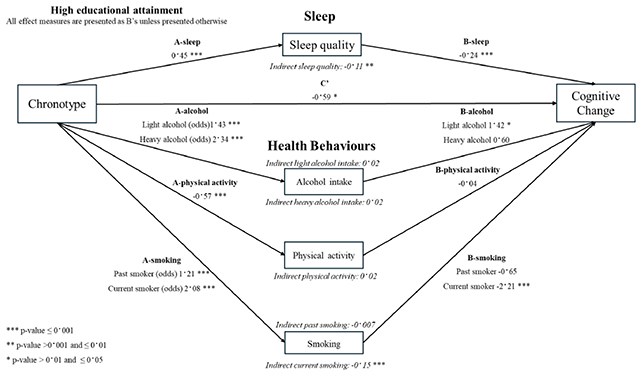We all have our own chronotype – a tendency to sleep at certain times, with early birds and night owls at opposite ends of the scale. A new study suggests this chronotype has some relationship to cognitive decline in those who have completed higher education.
Led by a team from the University of Groningen in the Netherlands, the study dug into the data on 23,798 individuals aged 40 and over in a public health research database. Sleeping habits were charted against scores on the Ruff Figural Fluency Test (RFFT), measuring cognitive ability, across the course of a decade.
Night owls who stayed up late and had a university-level education had a higher risk of cognitive decline, the data showed. The findings add important new information to efforts to understand aging and dementia, including Alzheimer's disease.
"In the high-educational group each one-hour increase in chronotype corresponded to a 0.80-point decline in cognition per decade," write the researchers in their published paper.
"In this group, sleep quality and current smoking mediated 13.52 percent and 18.64 percent of the association, respectively."
In other words, the quality of the sleep these people were getting, and whether or not they were smokers, affected the cognitive decline risk somewhat – but only to a relatively small degree. Smoking and reduced sleep are known to be linked to dementia.
The study isn't thorough enough to show direct cause and effect between being a night owl and having a more rapid rate of cognitive decline – there are just too many variables to consider. However, it does show a relationship that's worth investigating, and certain key factors were accounted for in the statistics.

"Physical activity, past smoking, and alcohol consumption did not explain the association between chronotype and cognitive decline," write the researchers.
"In the low and middle-educational attainment subgroups, no significant total and direct effects were observed."
Results from previous studies into this particular association have been mixed, and were based on varying approaches, but there is plenty of past research on the relationship between sleep and our well-being – night shift workers are more at risk of numerous health issues, for example.
The researchers put forward some suggestions for why well-educated night owls may see more cognitive decline, including having working hours that are more fixed and regular – so still having to get up early in the morning, even if they've stayed up late, and thus not giving the brain time to fully rest.
That more well-educated people have a higher cognitive level to begin with – which means a drop-off could be more noticeable – is something else mentioned in the study. The researchers also note that their study sample involved a low number of early bird chronotypes, which may have influenced the results.
As populations get older across the world, there are estimated to be around 57 million cases of dementia globally – a number expected to more than double by 2050 – which makes efforts to find out the causes of cognitive decline an increasingly urgent one.
"With rising life expectancies and aging populations worldwide, preserving cognitive health is an urgent global priority," write the researchers.
The research has been published in the Journal of Prevention of Alzheimer's Disease.
